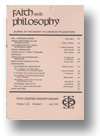|
articles |
|
1.
|
Faith and Philosophy:
Volume >
7 >
Issue: 3
Louis Dupré
Evil--A Religious Mystery:
A Plea for a More Inclusive Model of Theodicy
abstract |
view |
rights & permissions
| cited by
Major problems in modern theodicy derive from a rationalist conception of God---alien to living faith---and from an abstract, theologically neutral definition of good and evil. The alternative model here proposed rests on a more intimate union of finite with infinite Being which, on the one hand, allows the creature a greater autonomy and responsibility, and, on the other hand, enables the Creator to share in the suffering of his creatures and thereby to redeem them.
|
|
|
|
|
2.
|
Faith and Philosophy:
Volume >
7 >
Issue: 3
Arthur F. Holmes
Ethical Monotheism and the Whitehead Ethic
abstract |
view |
rights & permissions
| cited by
Whitehead’s rejection of a coercive divine lawgiver is well known, but the underlying ethic which led him in that direction needs to be examined. Arguing that he is an ethical naturalist with an aesthetic theory of value, and an act utilitarian, I find that this gives priority to eros over agape, limits moral responsibility, and obscures the depth of moral evil.
|
|
|
|
|
3.
|
Faith and Philosophy:
Volume >
7 >
Issue: 3
C. Anthony Anderson
Some Emendations of Gödel's Ontological Proof
abstract |
view |
rights & permissions
| cited by
Kurt Gödel’s version of the ontological argument was shown by J. Howard Sobel to be defective, but some plausible modifications in the argument result in a version which is immune to Sobel’s objection. A definition is suggested which permits the proof of some of Godel’s axioms.
|
|
|
|
|
4.
|
Faith and Philosophy:
Volume >
7 >
Issue: 3
Patrick Goold
Reading Kierkegaard:
Two Pitfalls and a Strategy for Avoiding Them
abstract |
view |
rights & permissions
| cited by
Søren Kierkegaard is an important thinker, especially important for those who wish to understand Christian faith. His elusive style, however, and certain distancing techniques make him particularly difficult to understand. The recent history of writings on Kierkegaard reveals a strong tendency to fall into one of two erroneous modes of interpretation. This essay is an attempt to rescue Kierkegaard both from muggings by ‘rigorous’ philosophers and from the morganatic embraces of Post-Modernists. It reviews the classical sources of each of these sorts of reading of Kierkegaard, exposes their mistakes, and suggests several appropriate principles of interpretation.
|
|
|
|
|
5.
|
Faith and Philosophy:
Volume >
7 >
Issue: 3
Petter Tumulty
Judging God by “Human” Standards:
Reflections on William James’ Varieties of Religious Experience
abstract |
view |
rights & permissions
| cited by
Contrary to religious fundamentalism, James insists on judging religion by human standards. Fundamentalists would object on two counts: i) a truly religious person must be willing to sacrifice everything, even reason itself, on the altar of faith; and ii) James reduces religion to a mere conventionalism by presuming to apply to it the very human standards religion itself must judge.The first response shows piety itself requires the autonomy of reason. The second shows James fully appreciates the critical role religion has played in our social evolution. However, this leads into a paradox, given our first argument, which is resolved if we accept at least the possibility, as James did, of a friendly relation between the divine and the human.
|
|
|
|
|
discussion |
|
6.
|
Faith and Philosophy:
Volume >
7 >
Issue: 3
Eleonore Stump, Norman Kretzmann
Theologically Unfashionable Philosophy
view |
rights & permissions
| cited by
|
|
|
|
|
7.
|
Faith and Philosophy:
Volume >
7 >
Issue: 3
Clement Dore
More on the Possibility of God
abstract |
view |
rights & permissions
| cited by
In this paper, I draw a distinction between two kinds of impossibility and maintain that one is entitled to suppose that they do not obtain, in the absence of a reason to think that they do. I claim that there is no reason to think that the first kind obtains with respect to God and that, though there are nonnegligible arguments that the second kind does, my argument for the possibility of God, which appeared in an earlier volume of this journal, adequately rebuts those arguments.
|
|
|
|
|
book reviews |
|
8.
|
Faith and Philosophy:
Volume >
7 >
Issue: 3
Thomas V. Morris
The Incarnation:
Collected Essays in Christology
view |
rights & permissions
| cited by
|
|
|
|
|
9.
|
Faith and Philosophy:
Volume >
7 >
Issue: 3
Kenneth Konyndyk
The Rationality of Religious Belief:
Essays in Honour of Basil Mitchell
view |
rights & permissions
| cited by
|
|
|
|
|
10.
|
Faith and Philosophy:
Volume >
7 >
Issue: 3
J. Kellenberger
Faith After Foundationalism
view |
rights & permissions
| cited by
|
|
|
|
|
11.
|
Faith and Philosophy:
Volume >
7 >
Issue: 3
William Hasker
On Divine Foreknowledge:
Part IV of the Concordia
view |
rights & permissions
| cited by
|
|
|
|
|
12.
|
Faith and Philosophy:
Volume >
7 >
Issue: 3
David Burrell
The Reality of Time and the Existence of God
view |
rights & permissions
| cited by
|
|
|
|
|
13.
|
Faith and Philosophy:
Volume >
7 >
Issue: 3
Joseph Runzo
Models of God:
Theology for an Ecological, Nuclear Age
view |
rights & permissions
| cited by
|
|
|
|
|
14.
|
Faith and Philosophy:
Volume >
7 >
Issue: 3
David Basinger
Water into Wine?:
An Investigation of the Concept of Miracle
view |
rights & permissions
| cited by
|
|
|
|
